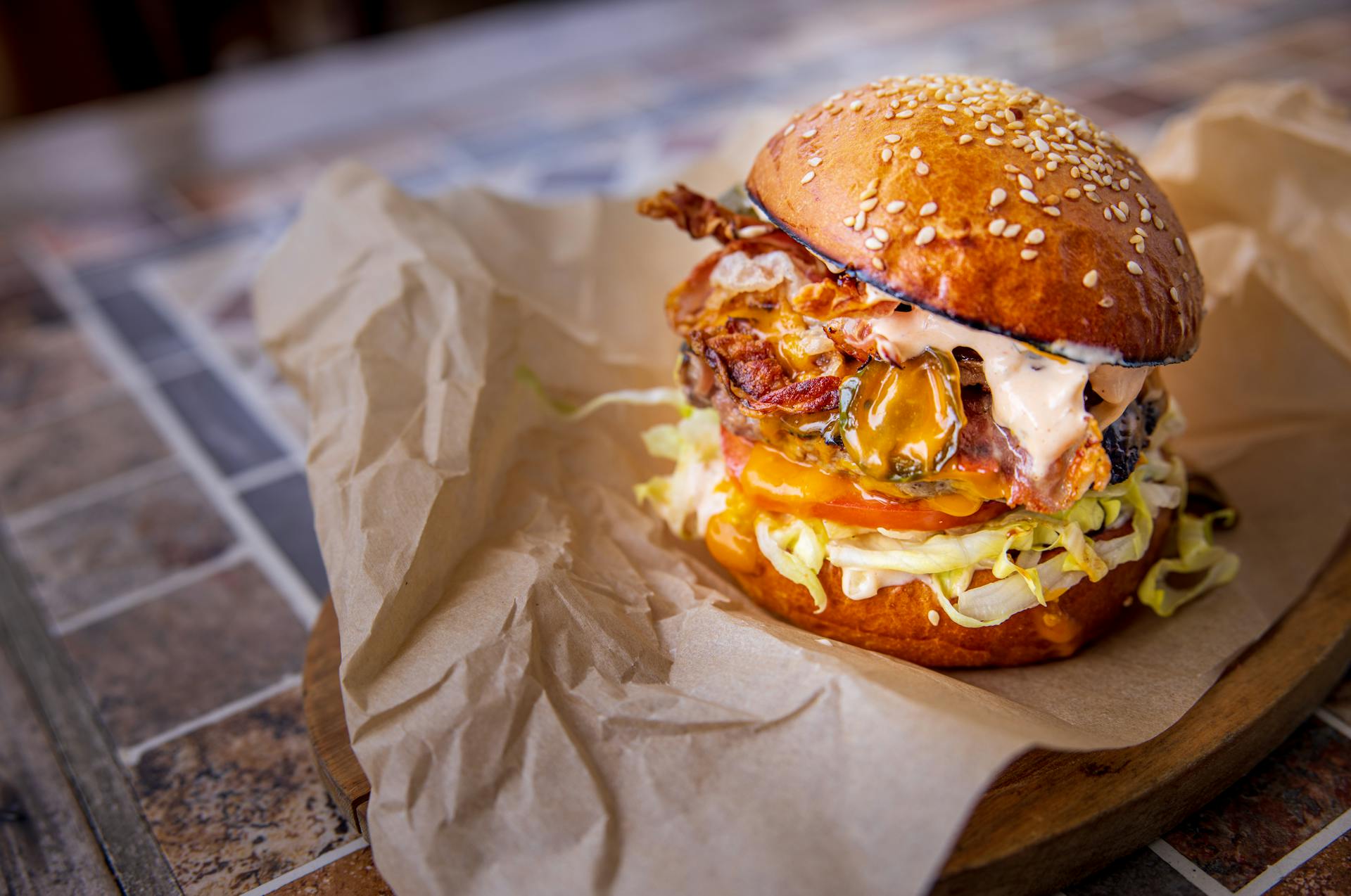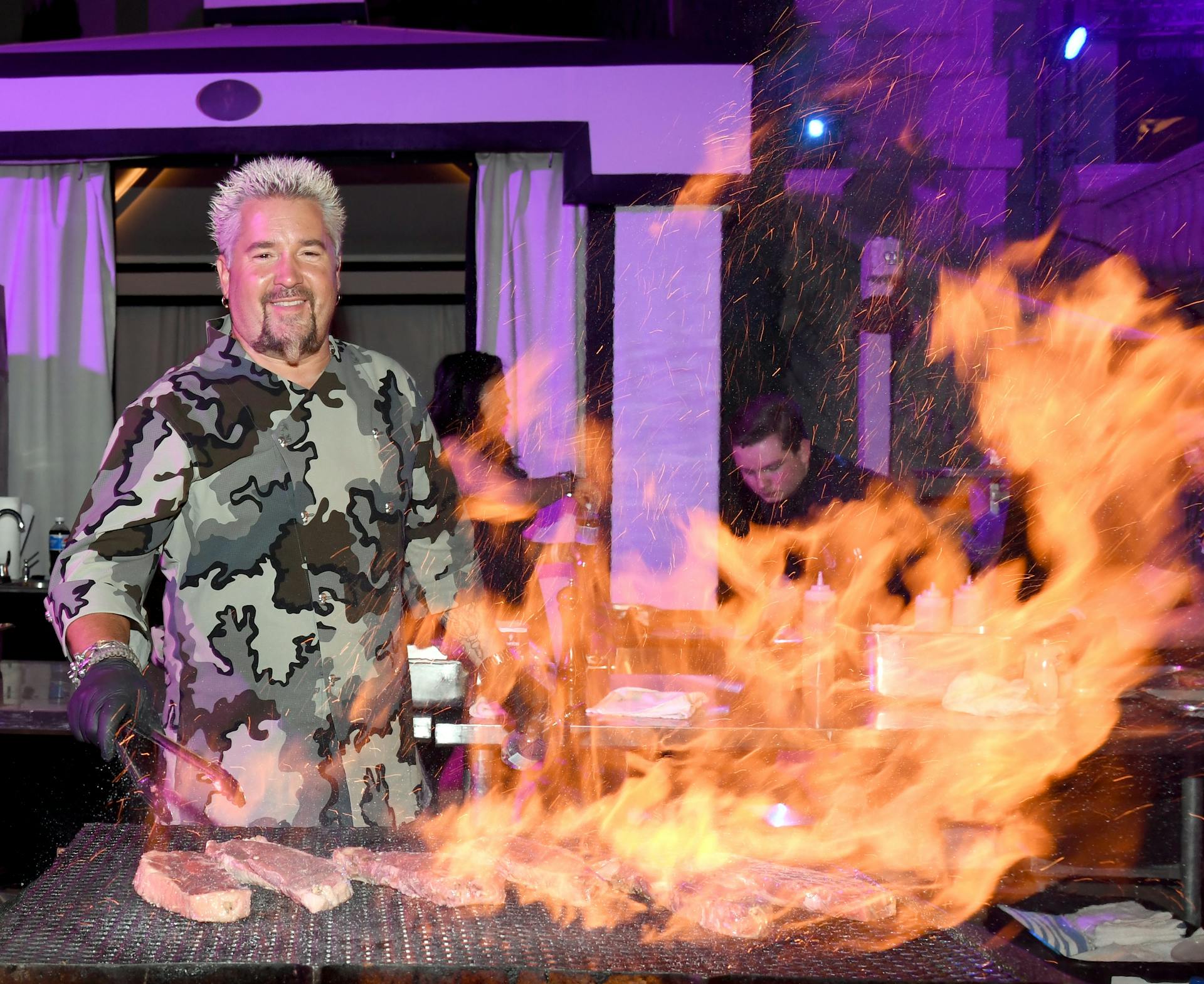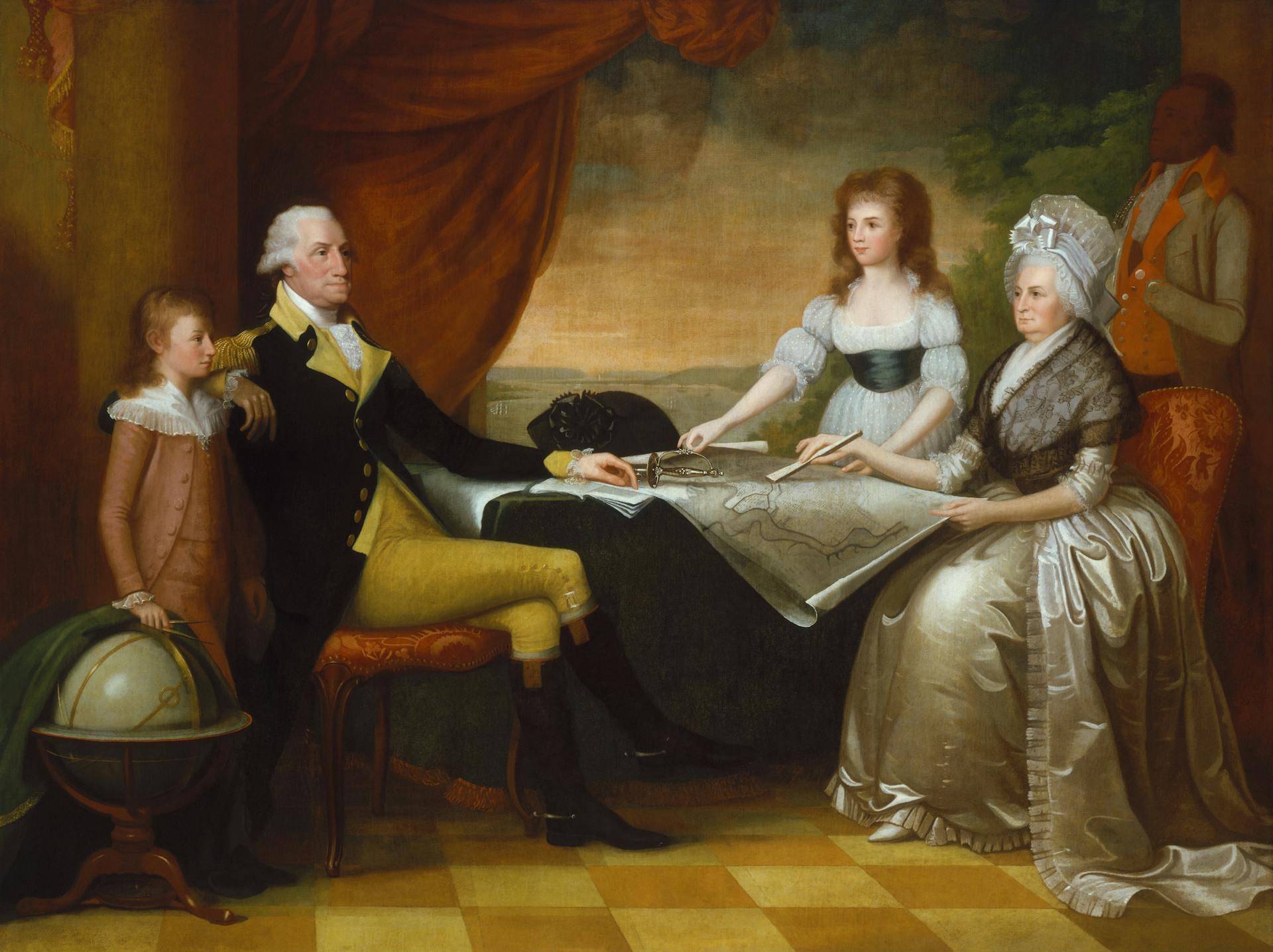Dude food is on a roll in America. Gargantuan pizzas, footlong subs, high-stacked burgers and extra-loaded nachos remain a basic choice for any real or pretend He-Man.
Eating dude food conjures not just manliness, however. There’s patriotism, too. TV networks keep churning out shows that celebrate the quasi-magical equation between generous portions, masculinity and devotion to country.
Guy Fieri, the multimillionaire guru of dudeism, has a clear-cut philosophy. His barbecues and other cooking performances are a means to celebrate American patriotism, counteracting what he describes as a lot of “infighting and democratic craziness that goes on” in the U.S.
 Neither George Washington nor Thomas Jefferson would have approved of this bacon cheeseburger. zoranm/Getty Images
Neither George Washington nor Thomas Jefferson would have approved of this bacon cheeseburger. zoranm/Getty Images
Dude food, Fieri says, would remind Americans about “what a great country we are and how lucky we are to be the greatest country in the world.”
But as an author of a new book on George Washington, notoriously the first among men, I can assure you that there was a time when dude food was not celebrated as either masculine or patriotic.
At that moment in American history, devouring heaping helpings wasn’t considered manly by the country’s leaders. It was seen as grotesque, perhaps even a vestige of aristocratic British habits: “I fancy it must be the quantity of animal food eaten by the English,” Thomas Jefferson wrote in 1785, “which renders their character insusceptible of civilisation.”
 Chef Guy Fieri demonstrates how real men cook real meat in real fire. Ethan Miller/Getty Images
Chef Guy Fieri demonstrates how real men cook real meat in real fire. Ethan Miller/Getty Images
Revolution meets the kitchen
After gaining independence, one of the founders’ main concerns was to make the new “experiment,” as they called the nation, as little “corrupt” and as little British as possible.
It was in the kitchen, Jefferson joked, that a “reformation must be worked.” He wasn’t entirely joking. Educating Americans to eschew gluttony, to cut down on red meat and to model their manliness upon ideals of moderation, self-control and other republican virtues was serious stuff to Jefferson and his fellow founders.
Self-styled manly men, today as well as a couple of centuries ago, eat a lot. And, as author Carol J. Adams writes in “The Sexual Politics of Meat,” they do not eat vegetables, berries or ingredients that can be easily cultivated or foraged.
But eating roast beef as King Henry VIII did wasn’t a habit American leaders sought to imitate, or in any way encourage. We are what we eat, an old adage says, and in the eyes of the founders, those who indulged in humongous servings or blood-soaked chunks of flesh couldn’t become a good model for the nation.
John Adams, the second president, found it “humiliating,” “degrading” and “mortifying” that Americans should excel in intemperance, regarding food or when it comes to their drinking habits.
“Is it not humiliating that Mahometans and Hindoes,” Adams asked, “should put to shame the whole Christian world by their superior examples of Temperance? is it not degrading to Englishmen and Americans that they are so infinitely exceeded by the French in this cardinal virtue and is it not mortifying beyond all expression that we Americans should exceed all other and millions of people in the world in this degrading beastly vice of Intemperance?”
Washington, for one, stood up as an example of temperance. He largely adhered to “a vegitable and milk diet,” eating only small amounts of red meat. Washington’s alimentary philosophy was to avoid “as much as possible animal food.”
Medical doctors, similarly, frowned upon the consumption of meat. In November 1757, for example, Washington was bedridden with dysentery. As the doctor arrived, he pronounced his therapy. “He forbids the use of meats,” Washington wrote in one letter.
 Thomas Jefferson believed in a diet dominated by vegetables, more than 300 varieties of which were grown in his garden at Monticello, shown here in 1987. Robert Alexander/Getty Images
Thomas Jefferson believed in a diet dominated by vegetables, more than 300 varieties of which were grown in his garden at Monticello, shown here in 1987. Robert Alexander/Getty Images
As a whole, Washington never turned his meals into occasions during which he would promote his masculinity. He always aimed for moderation – even if, by today’s standards, he does not appear ascetic.
Washington was fond of fish. On Saturdays, especially during his time as president, he usually had what was called a “salt fish dinner,” a potpourri of boiled beets, potatoes and onion mixed with boiled fish, fried pork scraps and egg sauce.
His soldiers as well had to learn the habit of temperance – and to learn it the hard way.
“The health of the army,” one of Washington’s orders goes, “cannot be preserved without a due portion of vegetable diet. This must be procured whatever may be the expense.”
Washington’s officers were expected not only to supervise the “cleanliness of the camp” but above all “to inspect the food of the men, both as to the quality and the manner of dressing it.” It was crucial to push soldiers “to accustom themselves more to boiled meats and soups and less to broiled and roasted, which, as a constant diet, is destructive to their health.”
It wasn’t only “destructive to their health”; it was a bad example for the nation. Many people could see the famous general and later the president eating moderately. Washington thus established a clear-cut difference between himself, a civilized and modern man, humble and calm, and those hapless creatures who were trapped at an inferior stage of civilization.
 George Washington, seen here in a family portrait, believed in eating ‘a vegitable and milk diet’ and avoiding ‘as much as possible animal food.’ Edward Savage painter, Andrew W. Mellon Collection, National Gallery of Art
George Washington, seen here in a family portrait, believed in eating ‘a vegitable and milk diet’ and avoiding ‘as much as possible animal food.’ Edward Savage painter, Andrew W. Mellon Collection, National Gallery of Art
Moderation and self-control
The founders’ culinary preferences were a political act. They were inviting men to repudiate one of their allegedly essential masculine privileges, the craving to sate their vast appetites.
“I have lived temperately,” old Jefferson explained to Dr. Vine Utley, “eating little animal food, and that not as an aliment, so much as a condiment for the vegetables, which constitute my principal diet.”
Adams, Washington and Jefferson didn’t fear that by abstaining from dude food they would have been seen as weak. They didn’t dread exclusion from male company. For them, moderation and self-control were more important manly assets.
Moderation and self-control, the founders believed, would give Americans a clearer mind to think about the future of their nation.
___
Maurizio Valsania does not work for, consult, own shares in or receive funding from any company or organisation that would benefit from this article, and has disclosed no relevant affiliations beyond their academic appointment.
___
10 game day snacks for football season
1. Air Fryer Buffalo Chicken Wings
UpdatedGame day wouldn’t be complete without wings. This buffalo wing recipe from Fufu’s Kitchen is packed with flavor thanks to a two-step seasoning process that involves coating the wings in a dry rub before drenching them in buffalo sauce.
2. Baked Jalapeno Poppers
UpdatedThese aren’t your freezer aisle jalapeno poppers. You can eat these with your pinky up. These vegetarian-friendly jalapeno poppers from Cookie and Kate are filled with herbed cream cheese and topped with a little golden cheddar to balance the spice of the pepper.
3. Queso Fundido
UpdatedQueso fundido is the party appetizer that makes everyone want to grab seconds. This recipe from Chili Pepper Madness has a kick from the spicy chorizo and a little crunch from cooked poblano peppers and onions. Top it with homemade salsa and avocado, and serve it hot with your favorite chips.
4. Fried Pickles
UpdatedIf you need a vegan appetizer on the table that everyone will enjoy, try this corn chip fried pickle recipe from Turnip Vegan. Serving it with the homemade Louisiana hot sauce aioli is a must.
5. Spinach Artichoke Dip
UpdatedCan a football watch party have too many dips? (The answer, obviously, is no.) This cheesy, creamy spinach artichoke dip from Robust Recipes is hiding a secret: It’s healthier than traditional recipes. White beans blended into the sauce and Greek yogurt to replace half of the cream cheese make this dip just as flavorful but a little lighter.
6. Healthy Vegan Onion Rings
UpdatedThese plant-based onion rings from From My Bowl are healthy enough that you can fill up your plate. Instead of frying in oil, this air-fryer recipe is oil-free and gets its crispiness from panko bread crumbs.
7. Homemade Mozzarella Sticks
UpdatedIf you’ve never made mozzarella sticks at home, you’re in for a treat. Frozen mozzarella sticks don’t compare. This recipe from Tip Hero is baked instead of fried, so you won’t need to deal with messy oil cleanup.
8. Mango Guacamole
UpdatedNeed more fresh produce at your game day party? This mango guacamole recipe from Maple & Thyme is a quick and easy way to add balance. The sweet mango makes this guacamole feel lighter and more refreshing.
9. Stuffed Mushrooms
UpdatedThese classic stuffed mushrooms from Simply Recipes are the perfect bite-size appetizer for football season. They’re vegetarian-friendly and easy to make vegan by skipping the Parmesan. You also can prepare them a day ahead and pop them in the oven before the game.
10. Cowboy Caviar
UpdatedCowboy caviar has been around for a long time, but it definitely had a viral moment in 2022. Loaded with fresh produce and beans, cowboy caviar is a versatile plant-based snack that can be eaten as a salad or with tortilla chips as a salsa. Try this recipe from Her Wholesome Kitchen, but feel free to add your own herbs or extra ingredients. There’s plenty of room to play around with this recipe.
With the holiday season rapidly approaching, football season underway, and this year looking a little more normal than last, it’s time to star…
This week's recipe roundup features appetizers, dips and wings that are great for game day parties or just a regular weeknight meal.





